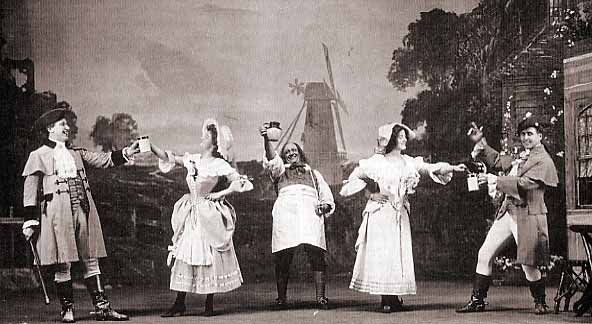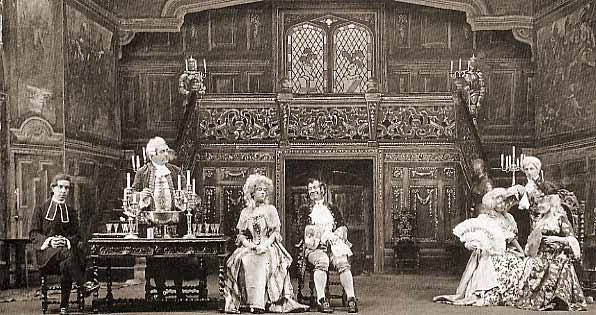 |
 |
||||||
![]()
ACT I - The Hop Field, outside the "Hop-Pole Inn."
THE country folk on the estate of Sir John Bantam are seen at the Hop-Pole Inn (kept by John Tuppitt) celebrating the finish of the hop-picking. Dorothy Bantam, Sir John's daughter, and Lydia Hawthorne, his niece, have donned peasant garb and intend to join in the festivities. They arrive at the Inn to find that Phyllis Tuppitt has promised to marry Tom Strutt, a young farmer.
Dorothy and Lydia have agreed that they will never marry, and endeavour to influence Phyllis to be of the same mind; but without avail. Dorothy's determination may arise from the fact that her father has already settled her wedded lot. If she marries anyone, it must be Geoffrey Wilder, Bantam's nephew and heir, for the old man has set his heart on the match. But she has never seen her cousin, who has been living a pretty wild life in London. As luck will have it, on this very day Wilder, on his way to his uncle's house, compelled by pressure of debt to cry "peccavi," and consent to Bantam's terms, arrives from town, with his friend Sherwood. They pull up at Tuppitt's inn to refresh themselves and rest the horses, which have been put to their best speed in getting out of the way of a certain Sheriff's Officer, Lurcher by name, who has been close on their heels all the way from London.
Dorothy, ever ready for fun, takes advantage of the dresses in which Lydia and she could hardly be recognised (even if her cousin knew her by sight), and passes herself and Lydia off as Dorcas and Abigail, Tuppitt's daughters. Wilder and Sherwood are impressionable, and the charms of the girls have such an effect that the plan of submission to the uncle is given up, even at the risk of arrest, and Dorcas takes the place of Dorothy in the matrimonial schemes of Geoffrey Wilder.

At this moment Lurcher overtakes his man, having got over the obstacles with which the fugitives have endeavoured to stop him. Wilder determined not to marry Dorothy, has a scheme by which he thinks he can get the money from his uncle. Lurcher would listen to no schemes if it were not for the fact that he has aroused the indignation of the villagers by serving a writ on an old woman of the neighbourhood. Wilder saves him from a ducking, and, in return, he promises to help in the scheme, and to join the two gentlemen in their visit to Sir John's house that evening.
Meanwhile, the attractions of her cousin have had a considerable effect on Dorothy; and Lydia, since she has seen Sherwood, is by no means so certain about perpetual spinsterhood. But, to test the value of the earnest protestations of their adorers, Dorothy gives her ring to Wilder and Lydia hers to Sherwood, the ladies extracting from the gentlemen a promise that they will never part with the tokens.
ACT II - Chanticleer Hall, home of Squire Bantam.
A RECEPTION is being given by Sir John Bantam to his county friends and neighbours, when the arrival of a stranger is announced, who proves to be Lurcher disguised as the Secretary of "His Grace the Duke of Berkshire." He craves hospitality for his Grace and his friend, Lord Crinkletop, whose carriage has broken down at the very door. Sir John gladly receives them, and we find they are really Wilder and Sherwood carrying out the scheme they concocted in the first Act.
Dorothy and Lydia now appear, but are not recognised by the two "noblemen," and Wilder makes an express stipulation with his friend that he is not to be bothered with his cousin Dorothy. As the evening passes, the charms of Lydia have a very serious effect on Wilder, while Sherwood is at Dorothy's feet. An opportunity soon occurs for Dorothy to show Lydia what "a base and faithless thing is man," by inducing Sherwood to give up the ring which Lydia had given him in the morning ; while Lydia has no difficulty in gaining possession of Dorothy's ring from Wilder.

In the meantime, night has come, lights are put out, the guests retire to rest, and in the dark, Wilder, Sherwood and Lurcher proceed to carry out Wilder's scheme. Cloaked and masked, they arouse Sir John's attention and pinion him. At the same time Sherwood binds Wilder. The house is soon roused by the cries; but when the guests reappear they are astonished to find that the robbers, whoever they are, have taken none of their host's money.
The "Duke," however, has not been so fortunate. His money-box is empty. To allow a guest to be plundered in his house, without making good the loss, is what Sir John cannot permit, and, after some little hesitation "his Grace" accepts as a loan the amount which is stated to be missing, and which happens to correspond exactly with the amount claimed of Wilder by the Sheriff.
The early dawn sets the men afoot with the hounds-for Sir John starts his autumn day, now and then, with a gallop after a cub-and while the ladies retire to their broken slumber, the gentlemen get ready for a morning's exercise.
ACT III - The Round Coppice.
THE Act opens as Phyllis is on her way to the Church to be married. And now Dorothy and Lydia propose to see what is the real value of the protestations of their fickle swains. Wisdom has come with the morning. Wilder and Sherwood have returned to Dorcas and Abigail, and have written to withdraw their pledges of the night before to Dorothy and Lydia. In reply to their letters, they have received a challenge (apparently from two young gentlemen, but actually written by the two girls), calling them to account for their conduct toward Miss Dorothy Bantam and Miss Lydia Hawthorne.
These two young ladies, in men's costume, are waiting in the Round Coppice to find out whether the men they have chosen will prefer a duel to giving them up. Lydia is nervous about the pistols, but Dorothy reassures her. They have brought their own pistols, which will only be loaded with powder. When, however, their adversaries arrive, they find they will have to use the pistols which those gentlemen have brought, and which will contain bullets.
It is with a not entirely unmixed feeling of satisfaction that they hear that the gentlemen decline to marry Dorothy and Lydia, and that they are prepared to risk their lives for the sake of Dorcas and Abigail; so eventually flight seems to be the only way out of the difficulty.
Sir John is on his way to the Round Coppice where Tom and Phyllis, who have been married, come for his blessing. Lurcher has betrayed the plot; but Sir John is ready to forgive everything if his nephew will marry Dorothy, and eventually the old gentleman has his way. Dorothy marries her cousin: Lydia marries Sherwood; and the awkward circumstances under which Dorothy's ring found its way on to Lydia's finger, and Lydia's ring on to Dorothy's, are overlooked, for each lady knows that her lover was ready to die rather than marry her friend.
Page modified 2 June 2017